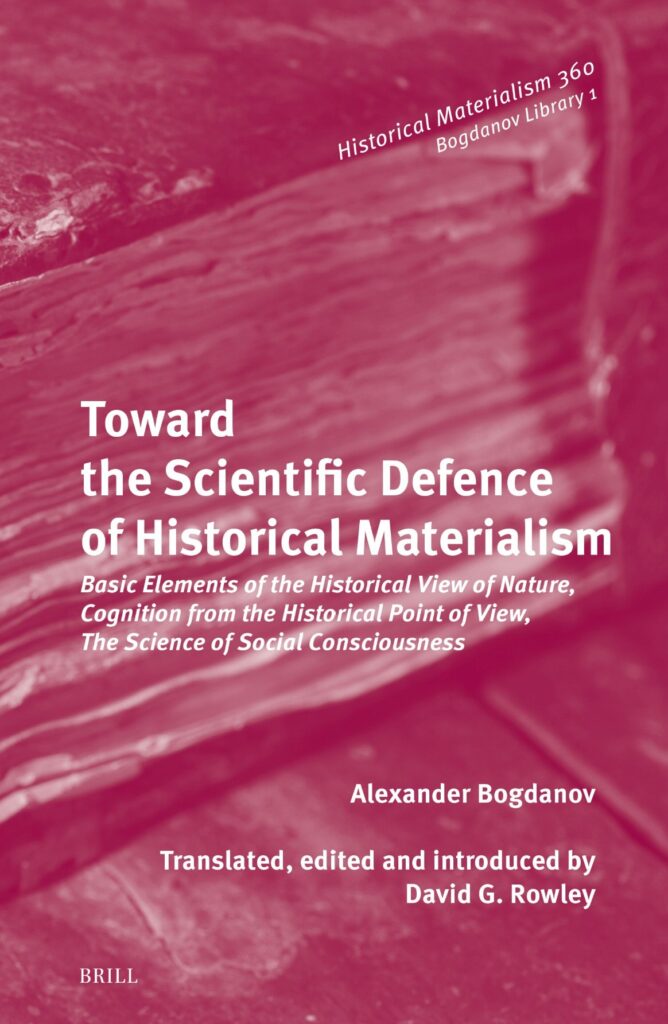Alexander Aleksandrovich Bogdanov
Biographical Note
David G. Rowley, Ph.D. (1982), University of Michigan, is Emeritus Professor of History, University of Wisconsin-Platteville. He has published a number of articles on Alexander Bogdanov’s thought and is the translator of several other volumes of the Bogdanov Library.
Readership
This book is particularly relevant for anyone interested in Marx’s philosophy of historical materialism, Russian Marxism during the revolutionary era, and Russian intellectual history more broadly.
Table of Contents
Introduction
1 Basic Elements of the Historical View of Nature
2 Cognition from the Historical Point of View
3 The Science of Social Consciousness
Basic Elements of the Historical View of Nature: Nature, Life, Psyche, Society
Introduction
1 What Is Meant by Truth, and Why Is It Necessary?
2 Concept and Word
3 Relative Truth
1 Nature
1 Stasis and Motion
2 The Form of Motions
3 Newton’s Laws of Motion
4 Inertia: The First Stage of the Cognition of Causality
5 The Law of Specific Action: The Second Stage of the Cognition of Causality
6 The Law of Energy: The Third Stage in the Cognition of Causality
7 The Fate of the Law of Causality
8 On the ‘Unchanging Essence of Things’
9 The Conservatism of Forms of Motion
10 The Dynamic Equilibrium of Forms of Motion
11 Forms in the Process of Change
12 Crises of Forms of Motion
13 The Appearance and the Destruction of Forms
2 Life
1 Motion and Life
2 Forms of Life
3 Universal Causality and Processes of Life
4 General Historical Propositions in the Realm of the Phenomena of Life: Conservatism, Formulae of Ongoing Changes, Crises
5 Reproduction of Forms of Life
6 Heredity
7 The Number of Forms That Spring Up and the Number That Are Preserved: Regarding the Boundaries of Life
8 The Law of Selection
9 Development
10 Reinforced Use
11 The Continuity of Development
12 Adaptation for Development
3 The Psyche
1 Nature and the Psyche
2 Psychical Forms
3 The Application of the General Principles of Causality to Psychical Forms
4 Psychical Forms as Forms of Adaptation
5 Psychical Forms as Distinctive Forms
4 Society
1 The Realm of Biology and the Realm of Sociology
2 Social Forms
3 Social Forms and General Formulae of Causality
4 Social Forms and Biological Causality (the Law of Selection)
5 The Continuity of Development of Social Forms
6 Technological Forms of the Social Process
7 Forms of Social Production
8 Forms of Distribution
9 Law and Morality (the Realm of Normative Forms)
10 Universal Ideological Forms – Cognitive Forms
11 Social Change
Conclusion
1 Can the Historical View Be Considered Unconditionally True?
2 Quality and Quantity
3 What Is Philosophy?
4 The Fate of the Historical Worldview
Appendix 1: On the Elements of Consciousness
1 The Basic Types of Facts of Consciousness
2 Feeling from the Energetical Point of View
3 Mental Images and Will from an Energetical Point of View
4 The Genesis of the Elements of Consciousness
5 Regarding the Emotions
6 Consciousness and the Unconscious
7 Consciousness and Memory
8 Psychical Selection
9 Stimulus and Sensation
Appendix 2: Supplement to Part 1, Chapter 7
Cognition from the Historical Point of View
From the Author
1 On Universal Method
1 Point of View
2 The Energetical Method and Critical Monism
3 The Energetical Method and Avenarius’s Biomechanics
4 The Order of Investigation
2 Cognition as Adaptation
1 Psychical Reactions
2 Forms of Consciousness
4 Sociality
5 Expressive Reactions
6 Forms of Cognition
7 How Forms of Cognition are Worked Out
3 On the Method of the Historical Theory of Cognition
1 The Place of the Historical Theory of Cognition in the General Series of Sciences
2 Deduction in the Various Sciences
3 The Abstract Method in the Social Sciences
4 The Abstract Method in the Historical Theory of Cognition
5 The Materialist Aspect of the Abstract Method of the Theory of Cognition
6 Extra-Cognitive Bases of Cognition
7 Forms of Collaboration and the Monist Tendency
8 The Further Course of Investigation
9 General Types of Forms of Collaboration and Forms of Thinking
10 Types of Labour and Types of Thinking
11 On the Boundaries of Eclecticism
12 On the ‘Presuppositions’ of Cognition
Science of Social Consciousness (A Short Course of Ideological Science in Questions and Answers)
Prefaces
1 Preface to the First Edition
2 Preface to the Second Edition
3 Preface to the Third Edition
Introduction
1 The Definition of Ideological Science
2 The Methods of Ideological Science
1 The Period of Primitive Ideologies
1 The Beginning of Ideologies
2 The Development of Ideology after the Primeval Era
2 The Period of Authoritarian Ideology
1 The Era of the Patriarchal Way of Life
2 The Era of the Feudal Way of Life
3 The Period of Individualistic Ideologies
1 The Ideal Form of Individualistic Society
2 Transitional Forms: The Slave-Owning System of the Classical World
3 Transitional Forms: (1) The serf system, (2) The Artisan-Guild System, (3) Merchant Capitalism
4 Industrial Capitalism
4 The Ideologies of Collectivism
1 The Technological and Economic Bases of Collectivism
2 General Features of the Ideologies of Collectivism
3 Labour Causality
4 Tendencies of Development of Science
5 Tendencies in the Development of Art
6 Social Norms
7 The Crisis of Proletarian Ideology in the World War
Conclusion
Bibliography
Index

